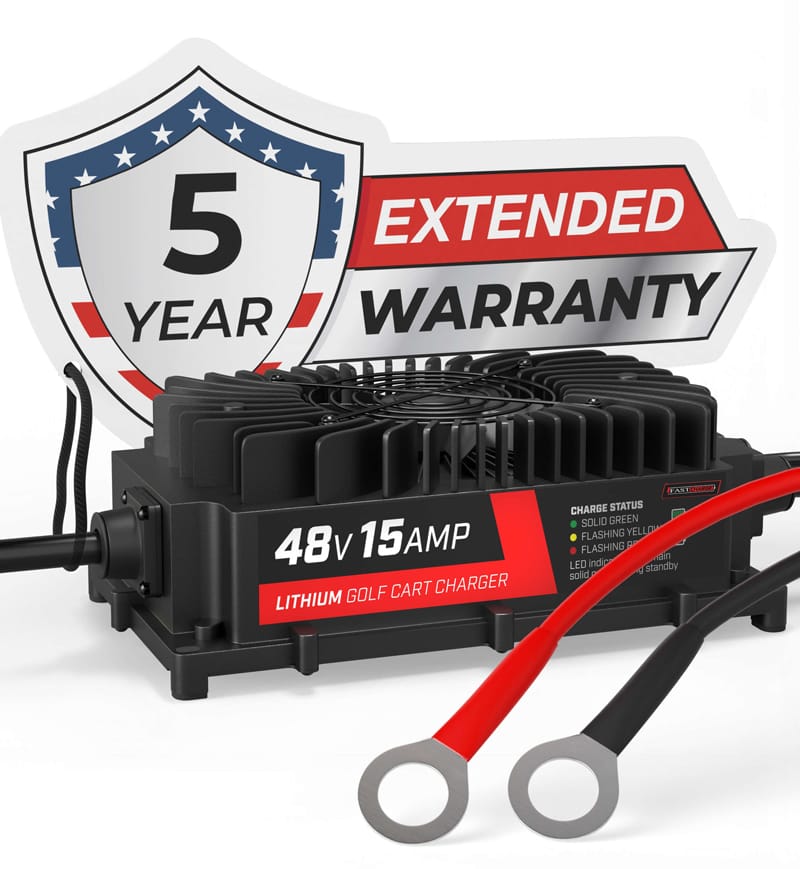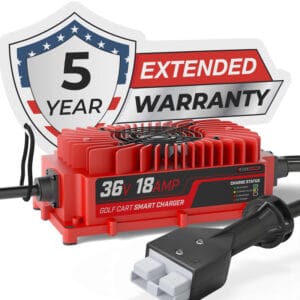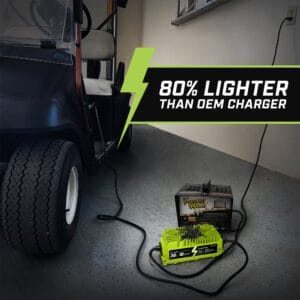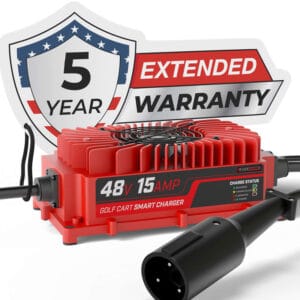1. Introduction
- Definition: A 48V golf cart charger is a device specifically designed to charge the batteries of electric golf carts that operate on a 48-volt battery system.
- Purpose: The primary function of the charger is to transfer electrical energy to the golf cart’s batteries, ensuring they maintain sufficient charge to support the vehicle’s normal operation. The quality and performance of the charger directly impact the battery’s lifespan and the overall performance of the golf cart.
2. Compatible Models
- Brands and Models:
- EZGO: Offers various 48V battery options, suitable for both residential and commercial use.
- Club Car: Known for its durability and performance, ideal for various golf course applications.
- Yamaha: Provides high-performance electric golf carts compatible with multiple chargers.
- Compatibility: Chargers must be compatible with specific types of batteries, primarily including lead-acid and lithium batteries. Lead-acid batteries typically require longer charging times, while lithium batteries support faster charging.
3. Types of Chargers
- Standard Chargers: Equipped with basic charging functions, suitable for everyday use, generally at a lower price point.
- Smart Chargers: Feature automatic adjustment of the charging process, optimizing charging based on the battery’s status, extending battery lifespan, and offering various charging modes to accommodate different usage needs.
- Portable Chargers: Lightweight design, ideal for travel and outdoor use, often equipped with multiple plug types and adapters for convenience in various settings.
4. Choosing the Right Charger
- Power Requirements: Select the appropriate wattage and voltage to ensure charging efficiency and compatibility with the battery. Common power options include 15A, 18A, etc.
- Charging Speed: Differences between fast charging and standard charging; fast charging is suitable for users who require frequent use, while standard charging is more appropriate for daily use. Charging time typically ranges from 6 to 8 hours.
- Safety Features: Chargers should include overload protection, short circuit protection, temperature monitoring, and other safety designs to ensure user safety.
5. Advantages of Chargers
- Extended Battery Life: Smart charging technology optimizes the charging process, reducing the risk of overcharging or undercharging, thus prolonging battery life.
- Enhanced Safety: Safety certifications and designs ensure user safety during operation, preventing battery overheating and other potential hazards.
- User-Friendly: Simple operation interface and indicator light functions make the charging process intuitive and easy to understand, catering to all users, whether beginners or experienced.
6. Buying Guide
- Price Range: From budget-friendly chargers (around 334.95), providing market references for consumers to choose based on their needs and budget.
- Recommended Brands: Popular brands include NOCO, BatteryMINDer, and Craftsman Golf, known for their reliability and technological innovation.
- NOCO GX4820: Suitable for various deep-cycle lead-acid and lithium-ion batteries, featuring high efficiency and safety.
- Eagle Performance Charger: Offers multiple charging modes, suitable for different battery types.
- User Reviews: Leverage user feedback to make informed purchasing decisions; reviewing other users’ experiences can help identify the strengths and weaknesses of products.
7. Usage and Maintenance
- Usage Tips: Ensure to follow the correct steps when connecting and disconnecting the charger to avoid damaging the battery or charger. It is advisable to check the battery status before charging.
- Maintenance Recommendations: Regularly check the health of both the charger and battery, clean contact points, and ensure the charger functions properly to extend the product’s lifespan.
8. Frequently Asked Questions (FAQ)
- Charging Time: A 48V charger typically takes 6 to 8 hours to fully charge, depending on the battery capacity and charger power.
- Battery Maintenance: Regularly check battery voltage, keep the battery clean, and avoid leaving the battery unused for long periods to extend its lifespan.
- Troubleshooting: If the charger is not working, check the power connections and charging cables for integrity; consult a professional technician if necessary.
9. Conclusion
- Summary: Choosing the right 48V golf cart charger not only enhances battery efficiency but also ensures user safety. Compatibility and safety are crucial factors when selecting a charger.
- Call to Action: Encourage readers to select the charger that suits their needs and provide purchase links for convenience.



